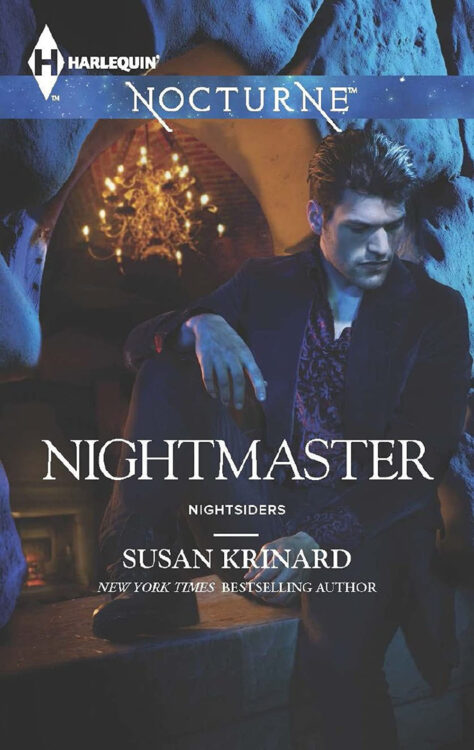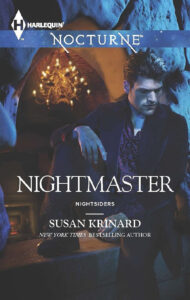Nightsiders, Book 2
Nightmaster
In the Nightsiders miniseries, New York Times bestselling author Susan Krinard delves into two very different worlds, each filled with lust and power…
Rumors of war are rumbling in the vampire city of Erebus. Undercover agent Trinity Ward must pose as a blood slave to unearth the truth and keep the peace between vampires and humans. Acting now as a serf to Ares—a powerful Bloodmaster—Trinity must give herself to him….
Yet one look into his striking eyes turns submission into burning desire. The fiery beauty has the same effect on Ares, but as their passion grows so do the risks. Now Trinity’s betrayal could cost her the mission—and the man she loves.
Read an Excerpt
Chapter 1
Trinity Ward waited with the other dozen convicts, her wrists aching from the grip of the padded cuffs that kept her hands locked together at her waist.
Not that she would have fought to escape. This was where she was supposed to be, among these poor, lost souls whose punishment was to be more terrible than mere imprisonment. Or even death.
They were condemned to a life of blood slavery to some Nightsider master in the Opir city of Erebus—an existence of unending servitude—until they were too old to provide blood or serve in any other capacity.
But these living offerings around Trinity, men and women who had committed only the most minor crimes, were not old. Some were in their late teens; the eldest couldn’t have been more than fifty. If not for the Treaty and the need to maintain the Armistice, they might have lived normal lives, sentenced by the Courts to jail time, probation and reparations.
Except that there were only two jails in the Enclave, and they were nearly empty. Crime had dropped to levels unknown in all of human history. Dropped so far that the bloodsuckers were growing restless.
“What did you do?” a young woman standing next to Trinity asked in a surprisingly calm voice.
Trinity met her gaze. She knew what the woman saw: normal human eyes, not the catlike pupils of a half human, half Nightsider dhampir. In a way, the contact lenses were like shields, not only concealing Trinity’s identity, but also helping her keep her distance from those around her.
Distance, Trinity thought, shouldn’t be a problem. She had been chosen for this assignment because she was known as the most unflappable, most controlled operative in all of Aegis. The one without close friends or lovers, because she wanted it that way.
Still, it was hard looking at this woman’s face, knowing she hadn’t earned the fate that awaited her. None of these people had.
“I didn’t pay my taxes,” Trinity whispered. “You?”
The woman’s brown eyes filled with tears. “I stole a pair of earrings. They weren’t expensive at all, but I hadn’t had something pretty like that in—” She broke off, her calm dissolving in grief and fear.
“I’m sorry,” Trinity said, awkwardly touching the woman’s arm.
“It wouldn’t be so bad if it weren’t for my daughter,” the woman said, wiping her eyes on her forearm. “She’s going to stay with my parents now. They’ll take good care of her. But I—”
She didn’t have to finish. Trinity knew what it was like to lose family. Not that she’d ever really had one. Her Nightsider father, whom she didn’t remember, had been killed at the end of the War when Enclave soldiers had found him in possession of Trinity’s mother and their daughter, treating both as prisoners rather than anything a human would call a “family.”
Trinity’s mother had taken her back to the Enclave. But there had never been another father. And Trinity had grown up half vampire in a world of humans who feared and hated the part of her that made her so different, so much faster and stronger and keener of vision, able to see in the dark and with teeth made for drinking blood.
Something most dhampires would rather die than sink to.
“My name is Trinity,” she said to her companion.
“Rachel,” the woman said, raising her bound wrists. “I can’t shake your hand.”
Suddenly they both laughed, the laughter of people without hope. Trinity wasn’t completely faking it. She knew her odds of coming out of this alive and free were minimal, but that wasn’t what she feared. She had to obtain the necessary information and get word out of Erebus. If this was to be her last assignment, she intended to make it count.
“Attention,” the soldier at the front of the column shouted, his helmet reflecting the sunlight. “You’ll be boarding the ferry now. When we reach the Larkspur Ferry Terminal, you will board a transport to the border of the Zone, where we will proceed on foot to the transfer point.” He scanned the small gathering, his eyes—and his feelings—hidden behind his visor. “Any disruption or attempt to escape will be met with force.”
He glanced at his fellow soldiers flanking the crooked line of dozen convicts and moved closer. “Stay alive,” he said in a soft voice obviously meant only for the prisoners. “There’s always a chance things will change. If we ever beat the bloodsuckers—”
“Sergeant!” one of the other soldiers said. “Ferry’s ready to board.”
The sergeant stepped back and nodded brusquely, gesturing with his rifle. The convicts walked onto the boat and moved to the center of the deck, heads down and shoulders slumped. The soldiers instructed them to sit on the hard benches under the canvas canopy and then clipped the prisoner’s ankles to rings fixed to the deck at their feet.
Trinity watched the soldiers patrolling the deck, far more than were needed to escort a dozen petty offenders. Did any of them have relatives or friends who’d been deported? She knew that the kin of politicians and higher-ups in the government were usually spared this punishment, including the board of directors of Aegis itself.
It wasn’t fair. But neither was the fact that the bloodsuckers had devastated the earth before the attrition of their own numbers had forced them into a truce. These men and women were soldiers, and sometimes soldiers did what they didn’t want to do.
You can never forget you’re only a slave from now on, she told herself. You have to make sure you ‘re chosen by the right Bloodmaster or Bloodlord. And then you have to make yourself indispensable to him.
That meant playing the part of a proper serf—and, if necessary, revealing her dhampir nature. Because, in spite of the supposed rarity of half-breed captives among the Nightsiders, it was believed that the leeches found nothing more delectable than dhampir blood.
Or more addictive. Some Nightsiders were highly prone to physical dependence on that same blood. And that was Trinity’s most powerful secret weapon. A dependent Nightsider was one she could manipulate.
But she intended to keep her true nature hidden as long as possible. In addition to the contacts, she wore caps over her front teeth to conceal her longer incisors, and no Nightsider she encountered would immediately be able to detect the difference in the smell and unique taste of her blood.
The experimental drugs she’d been given—drugs whose antidote had been inserted into one of her molars—would mask those differences until she didn’t need to hide them. They would also counter the addictive qualities of her blood until she required them. But just as important were the injections that were supposed to lessen the risk of Conversion or pregnancy.
Of course, no one was completely sure what happened when a dhampir was converted, in spite of the many times Aegis operatives had come into contact with Opir agents in the field. If any dhampir had become a Nightsider, he or she had never returned to the Enclave. And no one had ever seen the child of a dhampir and a Nightsider.
The engine of the ferry rumbled beneath Trinity’s feet, drawing her out of her thoughts, and soon the vessel was pulling away from the pier. No one spoke until they reached the Terminal in the old county of Marin. One boy of about eighteen let out a yell of sheer terror and then went silent when one of the soldiers turned his way.
After that, there was only more silence as the soldiers herded the prisoners to the truck.
The ride was jolting and uncomfortable, the truck carrying its unwilling passengers over roads left to weeds and weather, across fallow and overgrown fields, past empty towns and small cities that seemed to echo with ghostly voices.
Trinity stared straight ahead as the truck cut north toward the transfer point in the abandoned city of Santa Rosa. It was dusk when the truck reached its destination. The soldiers helped the exhausted prisoners climb down from the vehicle, unfastened the cuffs and offered them dinner rations and water. Some ate as if they were starving; others ignored the food completely.
Trinity ate. She needed all her strength, and because she was one of the sixty percent of dhampires who didn’t require drugs to digest solid food, she was free to eat whatever she wanted. Once she was finished, she listened to the hoot of an owl and the nearly silent footfalls of a coyote in the hills—sounds none of the humans could detect.
By sunset, as the human soldiers watched with guns raised and night visors glowing, the Nightsiders, anonymous behind their own visors, emerged from the fringe of oak woods at the base of the hills to the west.
In minutes the formal exchange had been made. The Enclave soldiers stepped back, and the Nightsiders closed in around the exiles.
No one put up a struggle. The Nightsiders spoke no more than was strictly necessary. The prisoners climbed into the hills and walked along narrow roads that wound through the Mayacamas mountains, wreathed in darkness lit only by the sweeping beams of the Opir soldiers’ headlamps. Halfway up to the pass, the Nightsiders made camp and allowed their charges to eat and sleep.
Trinity remained awake, listening and observing as the bloodsuckers spoke among themselves in their ancient language, hoping that one of them would be careless enough to reveal something that might be of use to her.
But none said anything she didn’t already know. After a while, the soldiers and their prisoners continued up the mountain, making camp again with the rising of the sun. The Nightsiders set up a shelter of heavy canvas, and two rested while the other two kept watch.
Near the end of the second night, they saw Erebus.
The vampire city was all black crystal spires and obsidian facets, a vast hive surrounded by pastures and fields of grain that produced food to keep the serfs alive and healthy. Trinity knew that Erebus housed some five thousand Opiri—and three times as many humans. Below the Citadel’s foundations lay countless chambers occupied by the lowest-ranked free Opiri and public serfs who served the city as a whole.
In the spires, the Towers, lived those of highest rank: the Bloodmasters and Bloodlords with their Households of vassals, serfs and client Freebloods. In their feudal society, rank and power were everything.
One of the prisoners began to weep and collapsed to her knees. A wiry man in his twenties helped her up with quiet words of comfort. Then they were moving again at a faster pace as the Opir raced the sunrise, descending out of the hills.
When the exiles were within a quarter mile of their new “home,” three of the soldiers picked up the slowest prisoners and flung the humans over their shoulders like sacks of grain. The rest, including Trinity, crept closer and closer to the Citadel until they were at its foot, gathering under the stares of the Freeblood guards along the sheltered battlements.
Trinity gazed up at the tall, heavy gates, obsidian black like the rest of the Citadel, and watched them swing inward. More Opir soldiers waited inside to take charge of the prisoners.
The humans stood inside a wide, enclosed area between the curtain wall and the Citadel proper. Heavy material that seemed to be a combination of canvas and plastic stretched across the open space several yards above Trinity’s head, protecting the Opiri within. Bright lights, harmless to the Nightsiders, shone from niches in the walls, obviously installed for the benefit of the human serfs, who were hard at work performing various tasks. The towers, visible through a slight gap in the canopy, pierced the lightening sky and the scudding, orange clouds.
The second set of soldiers uncuffed the prisoners’ wrists and gestured with their rifles toward a second gate on the other side of the courtyard. Moments later they entered a wide, dimly lit corridor, elaborately etched and painted with baroque designs and stylized figures in different hues. The corridor led to another and yet another, a maze humans might negotiate only with the aid of the changing colors and designs on each wall. Trinity could feel the passages descending into the bowels of the city, smelling of dampness and a taint of old blood.
The final corridor ended in a row of holding cells. Two by two the new serfs were ushered into the cells, and Trinity found herself housed with Rachel. The cell itself contained only two narrow cots, a toilet and a sink with towels.
“Are we supposed to clean up in here?” Rachel asked in a dull voice.
“I don’t know,” Trinity said, examining the sink. “There’s some kind of soap dispenser, but I can’t believe they expect us to do much with it.”
Nevertheless, she wet one of the towels, squirted a little soap on it and washed the grime off her face. She undid her hair from its rough ponytail and shook it out.
“You’ve got pretty hair,” Rachel said.
“Thanks,” Trinity muttered, hardly knowing how to react to the compliment. She wasn’t good at that even under the best of circumstances.
As Rachel washed her own face and sat on the edge of one of the cots, slumping in exhaustion. Trinity lay face up on hers, pillowing her head on her arms, and tried to clear her mind.
She knew what was coming: the Claiming, where the highest-ranked Opiri were given a chance to bid on the new serfs. Considering the process from an entirely intellectual perspective, Trinity knew the experience was going to be unpleasant. But her only goal was to catch herself a Blood-lord or Bloodmaster who would unwittingly help her achieve her goals. The higher the rank of her owner, the more freedom she was likely to have within the Citadel. And such freedom was what she needed to carry out her mission.
* * *
Trinity woke to the sound of the door to the cell swinging open. She jumped to her feet in a single motion, forgetting that she had to blend in with the untrained serfs. Rachel got up more slowly, shrinking behind Trinity as if she knew her cell mate was capable of much more than her ordinary appearance indicated.
In the doorway stood a Freeblood, white haired and pale skinned, no soldier but some kind of functionary in plain black robes. He gestured to Trinity and Rachel.
“You are to be prepared,” he said in a voice that told Trinity that he had little interest in the proceedings. “Come with me.”
She assumed her role as a subjugated human and walked out of the cell, Rachel on her heels. The other female prisoners were huddled in the corridor under the supervision of several black-robed Opiri. The Nightsiders herded the new serfs to the door of a much larger room, fitted with open showers, a row of curtained booths and three female attendants.
As Trinity and the other convicts entered the room, two of the attendants, wearing shapeless white shifts, smiled encouragingly. The third woman, dressed in a white tunic and trousers, was considerably more severe.
“You have to be examined,” she said without preamble.
Trinity stiffened and then forced herself to relax. She’d been thoroughly briefed, after all. The bloodsuckers had to know what they were bidding on.
The new serfs were instructed to undress, shower and then enter the booths. A few minutes later the examiner swept aside the curtain and entered Trinity’s cell. With practiced efficiency, the women examined Trinity’s body, looking for scars, disease or other defects.
She frowned as she finished. “Something different about you,” she said.
Trinity laughed to hide her unease. “I don’t know if that’s an insult or a compliment.”
The examiner sighed. “Are you a virgin?”
“No,” Trinity said, releasing her breath. “Is that important?”
“It doesn’t really matter,” the other woman said. “Not to most of them.” She made a notation on her pad. “You’ll do.”
The examiner instructed Trinity to dress, and then swept out of the booth. Trinity followed, and the attendant waiting outside gestured her to a seat facing a row of mirrors.
“The more attractive you appear,” she said, smoothing her fingers over Trinity’s damp hair, “the greater the chance that you will be claimed by an Opir of high rank and live a life of relative ease.” She selected a brush from among the items on the nearby shelf. “You have lovely hair. I think we’ll leave it loose.”
When the attendant had finished brushing Trinity’s hair to a glossy, chestnut sheen, she produced a shift similar to her own but much shorter and sheerer. It would do little to disguise the body beneath.
That, too, was no surprise.
The other prisoners were put through the same ordeal, and when the attendants were finished even the older women, dressed in more modest shifts, seemed nearly incandescent. Only their grim and frightened faces spoiled the effect.
“Be brave,” the elder attendant advised them. “Remember, your fate is at least partly in your own hands.”
The prisoners were led into the corridor where they met the equally dazed men, who were dressed in longer tunics and groomed to their greatest possible advantage. With the black-robed escorts around them, the humans were ushered into a large elevator, which swiftly ascended several floors.
When they arrived at their destination, the humans stepped into an entirely different world—not dark like the lower levels, but gleaming with saturated color like rich velvet and painted with golden symbols.
Trinity observed carefully as she was shown to a private cell, this one with a transparent front wall and no furnishings at all—the “display case” for the serfs to be claimed. Through the slightly opaque sidewalls she could make out the boy who had panicked earlier, though his face was only a blur.
Outside the clear wall was a semicircular room, a kind of covered amphitheater with rows of richly upholstered seats. Within minutes the first of the Opiri arrived, male and female, some dressed in embroidered robes that reached nearly to the floor, others in thigh-length tunics and loose pants tucked into handmade leather boots. Jewels cascaded from long white hair, at throats and belts; the men were as regally clothed as the women. Each and every one could pass as a king or queen of his or her own realm.
But one stood out from all the others. A silence fell among the murmuring Nightsiders as a tall lord wearing a long tunic, wide embroidered belt and trousers of deep blue entered the room. He appeared to be in his early thirties, but Trinity knew he could be anywhere from one hundred to ten thousand years old.
This man’s age wasn’t what interested her. He had raven-black hair. No Opiri except vassals, who retained their human coloring for some time, had anything but white hair. And this one’s skin, instead of being bone-white, was a very fair gold. His face was lean and handsome, and his eyes…
As if he sensed her stare, he looked directly at Trinity. His eyes were not the deep purple or maroon of a normal Opir’s; they were a pale tint of violet that would have been extraordinary in any human. Trinity could feel that gaze stripping her shift from her body.
Without taking his eyes from her, the Nightsider gestured to the young human male behind him. The attendant held a tall staff capped with what looked like an ancient Corinthian helmet cast of gold. He handed the staff to his master, and the Nightsider held it firmly planted on the floor beside his chair as if he were staking a claim to territory no one dared dispute.
He was powerful. Trinity didn’t need anything but simple observation to make that very clear. The other Bloodlords and Bloodladies kept their distance from him, and several seemed to regard his presence with surprise.
Trinity knew then that he was the one. She couldn’t have explained it rationally, but instinct told her she was right. Dhampir instinct. And she intended to trust what her half-vampire nature told her.
Even if it told her that she was feeling things she had no right or reason to feel. That suddenly she didn’t look upon surrendering her body and blood to a Nightsider as a terrible sacrifice.
And that feeling, unfamiliar and insane as it was, held far more danger than fear. Especially if her instincts were wrong, and this man was the cruelest, most barbaric bloodsucker in the Citadel of Night.
Chapter 2
Ares had expected nothing like the woman in the center cell.
It wasn’t only that she was beautiful. That was clear at first glance. The display at the top of the cell marked her as a healthy female of twenty-nine years, free of disease or obvious defect. Further description indicated that she was well educated in her own Enclave, fluent in the Opir tongue and several ancient human languages. Her hair, a rich coppery-brown, fell just past her shoulders. Her striking eyes were brown rimmed with green.
Those eyes gazed at him unflinchingly, as if she thought nothing of her near nudity and her pitiful situation. That was unusual in a new serf put up for Claiming. They were usually frightened and confused, rarely defiant.
Not this one.
Ares rested his chin on his fist, suddenly aware of all the sounds and scents and small movements in the room. He had come to the Claiming because Lady Roxana had convinced him that it was well past time for him to reinforce his rank as a Bloodmaster. He preferred keeping to himself and appeared in society only as often as maintaining his status made necessary.
But suddenly this ritual seemed far less pointless than he had expected.
He signaled to Daniel, who stood attentively behind his chair. Most of the other Bloodmasters and Bloodlords in the room had brought several servants, some merely as decorative accessories, some to provide fresh blood should their masters develop a thirst during the Claiming. Ares had far better control, and he believed in self-discipline, like the philosophers he admired.
“Wine,” he said. Daniel stepped away and returned with a cabernet bottled at Ares’s own vineyards to the north of the Citadel. The serf poured it into a crystal glass and offered it to his master.
“What do you think of her, Daniel?” Ares asked.
“Beautiful, my lord. Will you bid?”
The other Bloodmasters and high-ranking Bloodlords around Ares studied each serf with varying degrees of calculation, determining which might be an asset to his or her Household. But most Opiri were eager to claim the most attractive humans, and Ares could see that the woman had captured their attention as much as she had his.
Shifting in his seat, he realized his body was responding to the subtle curves of her figure and the warm scent that escaped through the ventilators in her cell. The blood beating just under the surface of her skin smelled of wine and wildflowers, sparking a need that surprised him.
Daniel knew him far too well. Ares was aroused as he had not been for some time, in spite of the excellent services provided by his Favorite. He took Cassandra’s blood and body because his physical needs had to be met. But it was never like this.
For the first time in years, Ares found himself considering making a claim.
That didn’t mean he would do so. It was one thing to admire the female, and quite another to let lust and hunger lead him around by the teeth.
So he waited, observing silently as the first of his prospective rivals rose to examine the serfs more closely.
“Palemon,” Daniel whispered.
Lord Palemon, Bloodmaster, Ares’s equal in wealth and status. Like Ares, he had walked the earth for centuries before the Awakening. He was a vicious killer and one of the leaders of the Expansionists, the Citadel’s war party, allied with equally malicious Opiri who scampered at his heels like hyenas after a lion.
Dripping with jewels and furs, the Opir lord moved casually toward the female’s cell. He paused to look over the serf in the cell next to hers, a boy just entering manhood as humans reckoned such things. The boy trembled and refused to look up from the floor.
Palemon turned his attention to the woman, who met his gaze through the transparent barrier without a hint of submissiveness. Palemon looked her up and down with careless disdain, as if he had no interest in her at all.
No one, least of all Ares, was deceived by his playacting. Palemon’s mouth twisted in a smile of haughty amusement. “This claims you are a scholar of some kind,” he said to the woman, briefly gesturing at the display above her. “A historian, well versed in the arts and sciences of previous eras.” He glanced back at Ares with deliberate mockery. “How extremely dull.” His smile vanished, and he turned to the woman again. “Remove your shift.”
The female heard him well enough, but she didn’t move. Almost immediately one of the black-robed Freeblood attendants entered the cell from the door behind and repeated Palemon’s command. She pulled on the ties at her neck and waist and the shift fell around her shapely ankles.
Several Bloodlords moved up behind Palemon, careful to keep their distance from him. Ares rose, handed his staff to Daniel and made his way through the gathering. There was no need for aggression; the others retreated to either side of his path, unwilling to Challenge one they were unlikely to defeat.
“She is a beauty, is she not?” Palemon remarked without turning. “Full breasts, hips made to fill an Opir’s hands and a neck begging to be bitten. And such a face, such bold eyes…”
“Why should she interest you?” Ares asked with a semblance of indifference. “All Erebus knows you hold more serfs than any other Opir in the Citadel. This one—” he waved a dismissive hand at the female “—if she is some kind of intellectual, she can hardly be your type.”
Palemon chuckled. “You must know how much I enjoy the challenge of a rebellious serf.”
Ares knew, and so did every other lord in the Citadel. Palemon acquired not only the most attractive humans for his Household, but also bid extremely high sums for those who seemed to require the most breaking. And when they were broken and he was weary of them…
“What makes you think she will be rebellious?” Ares asked.
“Look at her,” Palemon said. “She cannot hide it.”
Palemon, Ares thought, was perfectly correct.
As if she had heard his thoughts, the female looked directly into Ares’s eyes. He beckoned to the attendant.
“Let her dress,” he said.
Palemon eyed him with exaggerated surprise. “Is that pity, Ares?” he asked. “But of course every ranking Opir in Erebus knows how you indulge your serfs.”
“I find I receive better service if my humans do not live in constant fear of me,” Ares said.
“Ah, yes. And now, after years without a new serf, you finally found one worth claiming. It seems you have changed since we last had dealings with each other.”
“You have not. Or have you given up campaigning for war?”
“Still against us, I see.”
“I have seen nothing to change my opinion of your politics, Palemon.”
“Your politics are those of fear, Ares.”
“Fear of humans?” Ares smiled. “I merely wish to avoid any disturbance to my preferred way of life. If I were afraid of my serfs, I would treat them as you do. And I still wonder, Palemon, why you bother with Claimings when you can illegally breed humans to behave exactly as you wish.”
He and Palemon locked stares. The attendant in the cell bent to retrieve the female’s shift, but she snatched it out of his hands and held it loosely in front of her body. Her gaze darted from Palemon to Ares with an intensity Ares couldn’t interpret. It almost appeared as if she was pleading with Ares, and that hardly seemed in keeping with her demeanor.
But Ares didn’t doubt her intelligence. It shone in her bright eyes. She had certainly realized that Palemon would be a harsh, even brutal, master. And that Ares would be a far better one.
She was too young to have attained much wisdom, Ares thought. Still, she might provide him with the different perspective he had been seeking….
Oh, yes, he thought with a silent, cynical laugh. He could find many excuses for claiming this female. His blood was running hotter than it had in years, and he found it easy to envision her gratitude for her rescue from Palemon…imagine her in his bed, offering her neck and her body to him.
No act was more exhilarating to an Opir than taking a serf’s blood in the act of sex. Until, as with Cassandra, it became a matter of routine.
Routine that had perfectly satisfied him until today. And that made him wonder, with some bewilderment, how he could move from curiosity to calculation to surging lust in a matter of minutes—uncontrolled thoughts and emotions that tested the rationality and control he valued above all else.
He could think of no better trail of his discipline than taking this female as his serf.
“Where is the staid philosopher now, Ares?” Palemon asked, leading Ares to wonder just how obvious his reaction had been. “Have you discovered that you, too, have weaknesses of the flesh?” He lifted his head slightly, addressing the attendants who waited out of sight, prepared to record the offers. “Ten thousand bloodmarks and three prime serfs.”
Ares stiffened. It was a very high bid. “Twelve thousand,” he said.
Palemon raised a pale brow. “No serfs?”
“I am not required to offer any of my humans as part of my bid.”
“You are sentimental, Ares. A trait I think you will one day have cause to regret.” He waved his hand. “Fifteen thousand and five prime serfs, including two produced from my best breeding stock.”
Now he was openly defiant, advertising his “forbidden” activities. Ares glanced at the woman again. She was still looking at him, her skin pale but her gaze as direct as ever.
“Twenty thousand,” he said.
A deep hush fell over the room. It was an amount only the most wealthy Bloodmasters could afford to offer for a single serf.
“Twenty-five thousand and twenty prime serfs,” Palemon said, looking at Ares inquiringly. The silence pressed down on Ares as if all the weight of the Citadel were driving him deep into the earth from which the Opiri had arisen more than two decades ago.
He knew that if he exceeded Palemon’s final bid, he would be leaving himself dangerously vulnerable. His income was considerable, but he required it to provide for his serfs, maintain several client Freebloods and put on the occasional ostentatious display of wealth and power.
Any failure to uphold appearances put the elite of Erebus in constant danger of Challenge by a fellow Bloodmaster or ambitious Bloodlord, and if he impoverished himself, he would have to fight one foolish duel after another simply to maintain his status.
“She is not worth so much to me,” he said, turning away before he could observe the woman’s face again.
He retrieved his staff and started for the door, but some unfathomable compulsion made him stop and listen, his back to the rows of seats and the Opir lords and ladies awaiting their chance to claim the remaining humans. Daniel, carrying the wine and glass in their case, moved quietly out of his way.
The attendants were opening the woman’s cell. Ares could hear her sharp intake of breath as she fully understood her fate.
“My pretty little serf,” Palemon said. “I believe I shall enjoy you for some time. If you behave.”
Ares heard a scuffle, a gasp and a thump as a body fell heavily to the ground. He swung around. The serf, her shift torn away, was trying to rise from the floor. Her mouth was smeared with blood.
Primitive rage flared in Ares’s gut as Palemon jerked the serf to her feet and seized her mouth with his, licking up the blood as he thrust his tongue between her lips.
Ares strode back to Palemon and grabbed his rival’s shoulder.
“Stop,” he said, his voice sounding ragged to his own ears.
There were shocked exclamations among the observing Opiri. Palemon pushed the female away and jerked free of Ares’s grip.
“You dare?” he asked softly.
Ares held the other Bloodmaster’s stare, taking dangerous pleasure in Palemon’s astonishment. No Opir ever touched another without risking a violent reaction. It was considered one of the gravest insults one Bloodlord or Bloodmaster could give an Opir who was not demonstrably his inferior.
Ares glanced at the woman, who was wiping her mouth with the back of her hand in an obvious gesture of disgust. He knew then that Palemon would have to kill her in order to break her. She showed little emotion, but Ares could almost feel the banked fire inside her, just waiting to be released.
“Are you offering Challenge?” Palemon demanded.
If Ares had been thinking clearly, he would have realized that Palemon would be compelled to call for an accounting. If he failed to do so, he would lose status, inevitably leading to a catastrophic decline in fortune and, ultimately, death. Palemon himself hadn’t lost a Challenge since the founding of the Citadel, but he knew that Ares hadn’t lost one in centuries.
Even a victory would bring unwelcome disruptions to Ares’s life. But if he didn’t respond appropriately, it would be even worse.
Palemon had calculated very well indeed.
“I offer Challenge for the serf,” Ares said, “to disability.”
Palemon looked Ares up and down as if he were a human up for claiming. “You are badly out of practice, Ares,” he said, more confident now that he knew his life was not at risk. “I confess I am at a loss to understand why there have not been many more Challenges called against you. You are a freak of nature, an affront to our species. You should have been eliminated long ago.”
It was not the first time Ares had heard such threats. To the contrary, he had become accustomed to them more than two thousand years ago, after the most ancient and powerful Opiri had gathered to arrange the details of the Long Sleep.
“Do you intend to hurl insults,” he said, “or accept the Challenge?”
Palemon’s pale face turned grim. “I accept. And I will accept nothing less than my personal choice of half your serfs when I win.”
Ares was almost driven to laughter. But Palemon was still a deadly fighter, and it was conceivable that he might fulfill his boast.
“You will have nothing of mine,” Ares said.
Fury flared in Palemon’s eyes, though his expression remained unchanged. “We shall see,” he spat.
In the tense silence that followed, the attendants pulled the female away and gestured for the other Opiri and their serfs to clear the open area at the front of the theater. The unclaimed serfs huddled in their cells, as far from the observation windows as they could get.
The Bloodlords and Bloodmasters watching from the sidelines made no sound, but Ares felt the other Opiri’s poorly concealed eagerness, their bloodlust, their hunger to be entertained by the spectacle of two Bloodmasters locked in combat.
For the female it was no game. When Ares glanced at her one last time, he knew from the rigidity in her naked body and the way her fists clenched that she understood what was at stake.
Daniel came up beside Ares. “My lord,” he said, his voice strained with worry as he offered the staff to his master. “Is there anything you require?”
Blood, he meant. Palemon was already availing himself of one of his serfs, sloppily feeding with no regard to the comfort of the female he abused.
Ares shook his head. He shed his overtunic and shirt, tossed them to Daniel and ordered the human to the side of the room.
Wiping his mouth, Palemon allowed his other attendant to remove his tunic and strutted to his side of the area allotted for the fight. He banged the head of his staff against the floor, sending an echoing crack around the room. Ares did the same with his own staff and passed it to one of the attendants.
Then he abandoned the last vestiges of detachment and let the thrill of battle rise from within, his muscles tightening, his heart speeding. Palemon grinned, his teeth still stained with blood, and flexed his fingers. His nails, kept long as most Opiri preferred, were almost as deadly as claws.
The fight was swift and vicious. The only weapons permitted were strength, swiftness and the tearing bite of long, razor-sharp incisors. Twice Ares pinned Palemon to the ground, his teeth inches from the other Bloodmaster’s throat. But each time Palemon threw him off, and soon both of them were panting and dripping blood from numerous small wounds on their arms and chests. Three times Ares heard the female human gasp, once more giving the lie to her formerly dispassionate demeanor.
The thought of her naked body under his distracted him for one vital moment. Palemon lunged and drove Ares down, sinking his teeth into his enemy’s neck.
“No!”
The female ran toward them, as fearless as a hummingbird protecting its egg from a hungry crow. She struck Palemon on the shoulder. He reared back, lashing out at her, and she danced out of range.
Ares didn’t hesitate. He flung himself on Palemon, banged his head against the floor several times and bit down hard on the other Opir’s jugular. Blood gurgled in Palemon’s throat, and he gave up the struggle.
Rising to his feet, Ares stared down at his enemy and caught his breath. Palemon would recover from the bite; all Opiri healed as quickly in an hour as a human might over many days, or even weeks.
But Palemon was in no condition to move now, and Ares had no desire to gloat over his victory. He looked around the room at the other Opiri. None would meet his gaze.
That was as it should be. Ares had gone far to reinforce his status, and without seriously maiming his opponent as he could have done. Palemon was within his rights to demand a rematch because of the female’s unprecedented interference, but he would look the fool for seeming to suggest a serf had made a difference in the outcome.
No, Ares thought. When next Palemon Challenged him, it would be to the death.
As Daniel cautiously approached to return Ares’s clothes, the female stood with her arms wrapped around her chest and stared at Palemon with obvious shock at what she had done. It seemed incredible that she had put herself between two Opiri who could have torn her apart in an instant. But had her actions been born of ignorance, desperation…or almost unimaginable courage?
Now that she was unquestionably his, such questions would be answered in due time.
“Find another shift for the female,” Ares said to the nearest attendant. The Freeblood hurried off to fulfill his task and returned quickly with a slightly longer shift, less transparent than the first.
“Dress yourself,” Ares ordered the woman. Moving slowly, she held his gaze as she slipped the shift over her head and tied the belt around her waist. It was the most unattractive garment in all Erebus, one assigned to City serfs, yet she was still beautiful, her hair falling about her shoulders and the curves of her body very much in evidence.
“Would you have her bound, my lord?” the attendant asked.
“Should I bind you?” Ares asked the woman harshly in the Opir language, his blood still thick with the dregs of violence. “Or will you come with me of your own will?”

















